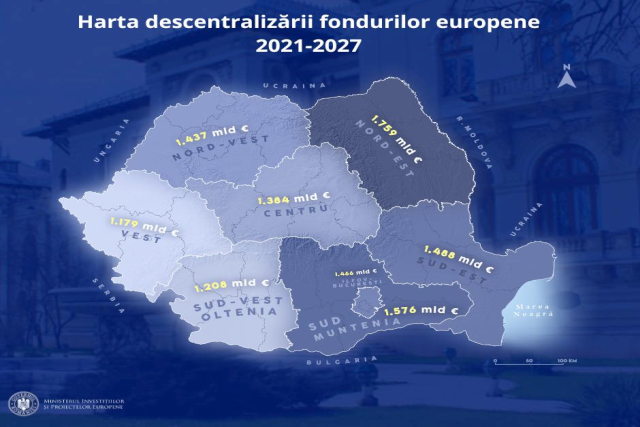European money for the development regions
The European Commission has approved the allocation of 1.4 billion Euros for the Bucharest - Ilfov development region.

Ştefan Stoica, 12.12.2022, 14:00
The Romanian Ministry of Investments and European Projects announced that it received official approval from the European Commission for the Bucharest-Ilfov Regional Program. The map of the European funds decentralization is thus complete, the institution officials said. The Bucharest-Ilfov Regional Program benefits from a total allocation of over 1.4 billion Euros and supports, through specific funding, the transformation of the region into a competitive region through innovation, digitalization and dynamic, digital, environmentally friendly enterprises, with high urban mobility and accessible. At the same time, Bucharest-Ilfov is to become, thanks to the projects financed by the EU, a region with a modern, attractive and inclusive educational infrastructure. The eight Regional Programs related to the period 2021-2027 benefit from a total allocation of over 11 billion Euros. With the approval of the Bucharest-Ilfov Program, all eight regional programs, corresponding to the development regions, received positive approval from the European Commission.
They were developed in such a way as to allow the transfer of administrative and financial powers from the central public administration to the public administration of the administrative-territorial units, together with the financial resources necessary for exercising these powers, the ministry representatives emphasized. ‘We are at a moment when we can state that the steps we started taking in 2020, in the previous mandate, have finally met with success, and this will have a great impact on the field of European funds’, they went on to say. The Bucharest-Ilfov region is a special region as compared to other development regions.
Although it has the smallest surface, it concentrates about 13.5% of the country’s population, being the most densely populated region, with the highest degree of urbanization. The program is meant to develop an intelligent, sustainable and inclusive economy in order to improve the standard of living and increase resilience to societal challenges. At the same time, the program will capitalize on the competitive potential and improve its ability to offer citizens and businesses an attractive, sustainable, clean and inclusive environment, in which they will want to live and invest, by promoting innovation, digitalization, fair access to modern public services, education and business opportunities. All these will take into account the need to streamline the energy consumption efficiency, to reduce CO2 emissions and adapt to climate challenges, minister Marcel Boloş said.
Development regions are not administrative-territorial units. They are areas that group several neighboring or geographically close counties, which provide a framework for the implementation and evaluation of the regional development policy. Each region is coordinated by an agency for regional development, the agencies being non-governmental bodies. (LS)






























